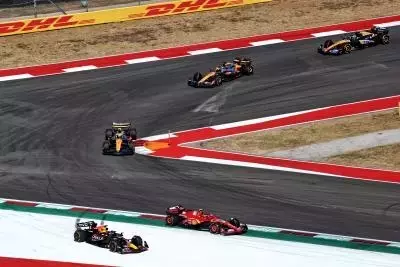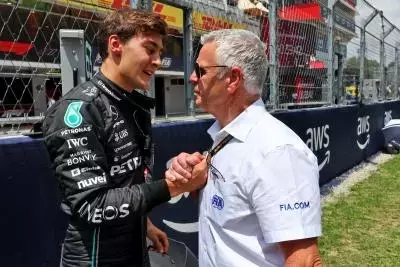The recent controversy surrounding the clash between Lando Norris and Max Verstappen at the United States Grand Prix has thrust the intricacies of Formula 1's racing rules into the spotlight. As drivers and teams gathered in the Mexico City paddock for media day, the subject dominated the agenda, with many expressing their frustrations and calling for a more consistent and common-sense approach to officiating.
Balancing Passion and Precision in F1 Racing
Embracing the Human Element in Motorsport
Ferrari's Charles Leclerc acknowledged the inherent complexity of the issue, emphasizing the need for "common sense" to be applied in certain situations. He argued that there will never be a single rule that can account for every possible scenario on the track, and that experienced officials should be empowered to make judgments based on the specific circumstances at hand. Leclerc's perspective underscores the delicate balance between the sport's desire for clear-cut regulations and the reality that racing, at its core, is a human endeavor driven by passion and split-second decision-making.Echoing Leclerc's sentiments, Red Bull's Yuki Tsunoda expressed his frustration with the current approach, which he believes is "expecting us to drive like machines, like AI, trying to follow every driving rule or whatever." Tsunoda argued that the essence of racing lies in the "battling between drivers" and the "passion" that fuels their on-track rivalries. He cautioned that if this element is removed, the sport risks becoming a mere simulation, devoid of the human drama that captivates fans.Consistency and Professionalism in Officiating
Mercedes drivers Lewis Hamilton and George Russell called for the introduction of a permanent set of stewards, drawing parallels to other professional sports that employ full-time referees. They argued that this would help to address the perceived inconsistencies in decision-making and provide a more reliable framework for enforcing the rules.However, Red Bull's Sergio Perez offered a counterpoint, suggesting that with the increasing number of races on the calendar, it may not be feasible to have a single set of stewards present at every event. Perez acknowledged the inherent challenges in officiating, noting that even with the best intentions, individual stewards may have differing opinions on the same incident.The Role of Circuit Design in Shaping Racing Dynamics
Ferrari's Carlos Sainz and Williams' Alex Albon proposed that circuit design could play a crucial role in addressing the ongoing issues with racing rules. Sainz argued that the introduction of gravel traps or other deterrents at specific corners could discourage drivers from attempting risky maneuvers, effectively "solving the problem itself" without the need for constant rule changes or interpretations.Albon echoed this sentiment, pointing out that certain circuits, such as Singapore and Monaco, rarely face the same controversies as other venues. He suggested that the presence of natural barriers and limited run-off areas on these tracks encourages drivers to exercise greater caution and respect the boundaries of the circuit.Revisiting the Fundamental Principles of Racing
Alpine's Pierre Gasly highlighted a specific rule that he believes requires re-evaluation, namely the principle of "who has their front axle first at the apex has priority." Gasly argued that this rule can incentivize "divebomb" maneuvers, where drivers commit to an overtake without fully being able to complete the corner, potentially creating more problems than it solves.Sainz acknowledged that this rule "changes a bit of the way we go racing," as it allows defenders to "brake as late as you want and you can fake that fact that you're trying to hit the apex when you're maybe not." He suggested that the events in Brazil 2021, where Max Verstappen ran Lewis Hamilton off the track and still maintained the lead, should have served as a clear indication that the rules need to be refined to ensure fairness and consistency.The discussions in the Mexico City paddock underscored the inherent complexities in balancing the sport's desire for clear-cut regulations with the realities of high-speed, wheel-to-wheel racing. As the Formula 1 community continues to grapple with these challenges, the search for a more comprehensive and equitable approach to officiating remains an ongoing pursuit, one that will undoubtedly shape the future of the sport.You May Like




